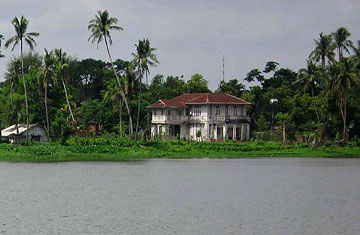
Supporters of Burma's Aung San Suu KYI look across Inya Lake at the home where the pro-democracy leader has been detained for much of the past two decades
The colonial-style villa in the Burmese commercial capital Rangoon looks like many other homes on Inya Lake, where some of the country's most influential citizens live. But for much of the past two decades, this dilapidated white-shuttered house on University Avenue has been a place of detention for Nobel Peace Prize laureate Aung San Suu Kyi, whose democratic activism has earned the ire of the country's notorious ruling junta. On May 3, though, the closely guarded house had an unexpected visitor.
According to Burma's state press, an American man confessed to swimming across the lake in the cover of night and staying in Suu Kyi's compound. Identified as 53-year-old John Yeattaw, he was arrested on the long swim back to the other shore on the morning of May 6. The man was found with, among other things, an American passport, U.S. dollars, a pair of pliers, a camera and a five-liter water bottle that would have came in handy as a float, according to the government-run media. (See pictures of Cyclone Nargis' devastation in Burma here.)
Swimming in Inya Lake near Suu Kyi's home is banned, and the opposition leader is rarely allowed any visitors, apart from her doctor. Roadblocks often discourage passersby and people who do manage to get near the front gate are usually photographed by security personnel. No previous successful attempt of someone sneaking into her house from the lake has ever been reported.
In 1990, Suu Kyi's National League for Democracy (NLD) overwhelmingly won nationwide elections. But the junta, which has ruled since 1962, ignored the results and soon placed Suu Kyi under house arrest. Her latest stint of detention is set to expire at the end of May, but an NLD spokesman said the 63-year-old opposition leader's official appeal to be freed was denied earlier this month. (Read "Burma Crackdown Reflects Junta's Insecurity.")
Burma's junta has called for elections next year, a crucial step in what the military calls the formation of a "discipline-flourishing democracy." But most outside observers worry that the polls will be marred by stuffed ballot boxes and coerced votes for the military. Electoral rules are skewed, too, reserving top posts for members of the army and denying public office to anyone with a prison record or who was married to a foreigner. (Many NLD members have been thrown into jail, and Suu Kyi was married to a British academic who died of cancer.) (Read "In Burma, Even a Sham Election Is a Cause for Hope.")
In late April, Suu Kyi's NLD held a rare conclave to discuss whether they would take part in the polls. Some argued that joining the electoral process would give an unwarranted air of legitimacy to a process whose outcome had likely been decided in the army's favor. Others, however, believed that not participating would be an abdication of electoral responsibility. In the end, the NLD released a statement saying they would play a part if the Burmese government released the more than 2,100 political prisoners languishing in jail. The NLD also called for the release of the woman most Burmese refer to simply as "the Lady." But it's unlikely that the junta will meet such demands.
Suu Kyi's own thoughts on electoral participation aren't completely clear, given the isolation imposed upon her by the junta. Evading the patrols in Inya Lake may be the only way to find out, but security has already been tightened around her home. After the American's arrest, a troop of police barged into the opposition activist's home and more road blocks were placed near her compound. The Lady shouldn't expect any more surprise guests.
